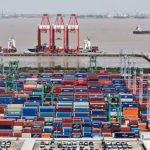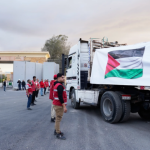
Global Sumud Flotilla: More than a symbol?
When the Global Sumud Flotilla set sail in late September 2025, its organisers knew they were not only embarking on a voyage across the Mediterranean, but also into the heart of one of the world’s most entrenched moral and political crises.
The flotilla, made up of dozens of vessels and hundreds of participants from across the globe, sought to deliver desperately needed aid to Gaza and to confront Israel’s naval blockade.
It is both a humanitarian act and a political declaration: that the world could no longer look away while an entire population was being starved into submission.
The word ‘sumud’ means steadfastness in Arabic, a concept deeply rooted in Palestinian history. Organisers emphasised that this was the largest such mission in years, bringing together parliamentarians, doctors, lawyers, human rights defenders, and well-known activists such as Greta Thunberg.
Our very own Shahidul Alam, sailing on the Conscience — the largest vessel in the Global Sumud Flotilla, wrote on his Facebook, “We are further behind from the rest of the flotilla. The ones in the front have already been attacked. We continue on our path to Gaza, undeterred by this intimidation. We will break the siege. Palestine will be free.”
“This is a people’s response to deliberate starvation,” the organisers said, arguing that while governments debated and delayed, ordinary citizens had a duty to act. They intended to break the isolation of Gaza by physically carrying food, medical supplies, and solidarity into a besieged enclave.
What followed was predictable. In early October, Israeli naval forces intercepted the flotilla before it could reach Gaza. Nearly all vessels were seized, participants detained, and the aid redirected or blocked. Israel justified the action by invoking security concerns and the need to keep humanitarian supplies within “safe, established channels”.
Yet rights groups dismissed these claims as a paper-thin cover for the continuation of collective punishment.
Amnesty International’s Secretary-General Agnès Callamard condemned the seizure as a “brazen assault on a peaceful humanitarian mission,” warning that “the deliberate starvation of civilians in Gaza is a war crime” and demanding the immediate release of detained activists.
The flotilla’s organisers and their supporters see the interception as part of a long pattern. For years, Israel has labelled such solidarity efforts “provocations” and sought to criminalise or delegitimise them.
But the facts on the ground are undeniable: Gaza is experiencing famine conditions, its hospitals have collapsed, and international aid convoys have repeatedly been blocked or bombed. Human Rights Watch has consistently described Israel’s blockade as unlawful, arguing that it amounts to collective punishment in violation of international humanitarian law.
In this light, the flotilla was not a stunt but a desperate attempt to expose the hypocrisy of a global system that continues to tolerate Israel’s impunity.
The timing of the flotilla’s interception is significant. It coincided almost exactly with Donald Trump’s unveiling of a new peace proposal for Gaza, a 20-point plan that he claimed would pave the way for a ceasefire, reconstruction, and a transitional governing body.
The plan was quickly endorsed by Benjamin Netanyahu, who hailed it as aligning with Israel’s war aims. Yet Palestinian analysts and civil society voices were scathing.
Diana Buttu, a former adviser to the Palestine Liberation Organization, told Al Jazeera that Trump’s agreement “contains almost nothing else positive for the people of Palestine… If you read the agreement itself, there are no guarantees provided to the Palestinians, not a single guarantee. All guarantees are provided to the Israelis.”
That lack of guarantees is precisely what the Global Sumud Flotilla was designed to highlight. Trump’s plan envisions aid being delivered through controlled and conditional channels, with oversight mechanisms dominated by the very states complicit in Gaza’s destruction.
The flotilla, by contrast, insisted on direct, unconditional delivery — a physical demonstration of the principle that starving people cannot be made to wait for political settlements that may never materialise. Amnesty’s Callamard captured this tension clearly when she argued that states cannot invoke “security” as an excuse for starving






![Pakistan accuses the TTP of carrying out attacks on its territory and the Afghan Taliban government of harbouring the group [File: Fayaz Aziz/Reuters]](https://asiandiplomacy.com/wp-content/uploads/2025/10/2023-02-27T041341Z_1777986366_RC2O7Z9GI1FB_RTRMADP_3_PAKISTAN-BLAST-POLICE-1760256429-150x150.webp)